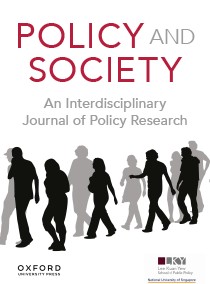“Provide our basic needs or we go out”: the COVID-19 pandemic lockdown, inequality, and social policy in Ghana
IF 5.7
1区 社会学
Q1 POLITICAL SCIENCE
引用次数: 10
Abstract
The effects of the coronavirus disease (COVID-19) pandemic cuts across every facet of a nation’s life. The near collapse of economies with the attendant job losses has brought forth the need for effective social policies, particularly in developing countries, that can serve citizens in dire need. Consequently, many of these countries have had to craft emergency social policies to help their citizens. Ghana is no exception. While measures to control the spread of the pandemic, such as lockdowns and restrictions on movement and gathering, were timely, they negatively impacted the poor, most of whom work in the informal sector and depend on daily survival activities such as buying and selling basic goods. As a result, some of the measures were ignored as people feared they would die from hunger rather than from the pandemic. Thus, governmental response to the pandemic was highlighted by policy layering and exposed the fragile social support systems in existence. The challenges of responding adequately to the pandemic underscore the importance of a transformative social welfare regime in ensuring the protection of citizens. This paper, based on desk research, explores the limitations of the existing social policy framework, which became manifest during the implementation of Ghana’s pandemic policies. Policy layering by government continues to weaken Ghana’s social welfare system, and this affected the official response with respect to the social issues that have emerged due to the pandemic.“满足我们的基本需求,否则我们就出去”:加纳的COVID-19大流行封锁、不平等和社会政策
冠状病毒病(COVID-19)大流行的影响遍及一个国家生活的方方面面。由于经济几近崩溃,随之而来的是失业,因此需要制定有效的社会政策,特别是在发展中国家,以便为急需帮助的公民服务。因此,其中许多国家不得不制定紧急社会政策来帮助其公民。加纳也不例外。虽然封锁和限制行动和集会等控制大流行病传播的措施是及时的,但这些措施对穷人产生了负面影响,他们中的大多数人在非正规部门工作,依靠买卖基本商品等日常生存活动。结果,有些措施被忽视了,因为人们担心他们会死于饥饿,而不是死于大流行。因此,政府应对大流行的政策分层突出,暴露了现有社会支持系统的脆弱性。充分应对这一大流行病所面临的挑战凸显了变革的社会福利制度在确保保护公民方面的重要性。本文以案头研究为基础,探讨了现有社会政策框架的局限性,这些局限性在加纳实施大流行病政策期间变得明显。政府的政策分层继续削弱加纳的社会福利制度,这影响了官方对因疫情而出现的社会问题的反应。
本文章由计算机程序翻译,如有差异,请以英文原文为准。
求助全文
约1分钟内获得全文
求助全文
来源期刊

Policy and Society
Multiple-
CiteScore
18.00
自引率
6.50%
发文量
43
审稿时长
30 weeks
期刊介绍:
Policy and Society is a prominent international open-access journal publishing peer-reviewed research on critical issues in policy theory and practice across local, national, and international levels. The journal seeks to comprehend the origin, functioning, and implications of policies within broader political, social, and economic contexts. It publishes themed issues regularly and, starting in 2023, will also feature non-themed individual submissions.
 求助内容:
求助内容: 应助结果提醒方式:
应助结果提醒方式:


